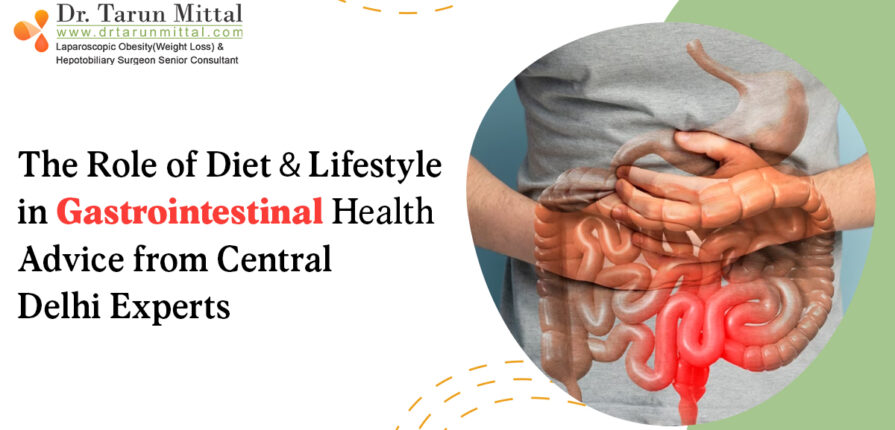Gastrointestinal (GI) health is a cornerstone of overall well-being. Your digestive system not only processes the food you eat but also plays a vital role in nutrient absorption, immunity, and even mental health. Maintaining a healthy gut involves more than just treating symptoms; it requires a proactive approach to diet and lifestyle. In this blog, we’ll explore how you can support your gastrointestinal health with expert advice from a leading gastrointestinal surgeon in Central Delhi, Dr Tarun Mittal at Sir Gangaram Hospital.
1. Understanding the Importance of Gastrointestinal Health
Your gastrointestinal tract, or gut, is a complex system that includes the mouth, esophagus, stomach, intestines, and other digestive organs. A well-functioning GI system is crucial for:
- Nutrient Absorption: Ensuring your body gets the vitamins, minerals, and energy it needs.
- Immune Function: The gut is home to a significant portion of your immune system, helping to protect against pathogens.
- Mental Health: The gut-brain axis connects your digestive system with your brain, influencing mood and mental well-being.
Dr Tarun Mittal, a highly regarded gastrointestinal surgeon in Central Delhi, emphasizes that a balanced diet and healthy lifestyle are foundational to maintaining a healthy gut.
2. Dietary Choices for Optimal Gut Health
What you eat has a direct impact on your gastrointestinal health. The right foods can promote a healthy gut flora, reduce inflammation, and support regular digestion. Here’s how to optimize your diet:
- Fiber-Rich Foods: A diet high in fibre is essential for gut health. Fiber aids in digestion and helps prevent constipation. Include plenty of fruits, vegetables, whole grains, and legumes in your diet.
- Probiotics: Probiotics are beneficial bacteria that support a healthy gut microbiome. Yoghurt, kefir, sauerkraut, and other fermented foods are excellent sources of probiotics.
- Prebiotics: These are non-digestible fibres that feed the good bacteria in your gut. Foods like garlic, onions, bananas, and asparagus are rich in prebiotics.
- Hydration: Drinking enough water is crucial for digestion. Water helps break down food and allows nutrients to be absorbed more efficiently.
- Limit Processed Foods: Highly processed foods, high in sugar and unhealthy fats, can disrupt the balance of bacteria in your gut and lead to inflammation.
According to Dr Mittal, patients who follow a diet rich in whole foods and low in processed items often experience fewer digestive issues and better overall health.
3. Lifestyle Factors Impacting Gut Health
In addition to diet, several lifestyle factors play a crucial role in maintaining gastrointestinal health:
- Regular Exercise: Physical activity stimulates the digestive system, helping food move through the intestines more efficiently. Aim for at least 30 minutes of moderate exercise most days of the week.
- Stress Management: Chronic stress can negatively impact your digestive health by altering gut motility and increasing the risk of conditions like irritable bowel syndrome (IBS). Practices such as yoga, meditation, and deep breathing can help manage stress levels.
- Sleep: Poor sleep can disrupt your gut health. Aim for 7-8 hours of quality sleep per night to support digestion and overall well-being.
- Avoid Smoking and Excessive Alcohol: Both smoking and excessive alcohol consumption can damage the lining of the digestive tract, leading to conditions like acid reflux and gastritis.
Dr Tarun Mittal at Sir Gangaram Hospital advises his patients to adopt a holistic approach to gut health, combining a balanced diet with healthy lifestyle choices.
4. When to See a Specialist
While diet and lifestyle are key to maintaining gut health, it’s important to recognize when professional help is needed. If you experience persistent digestive symptoms such as chronic heartburn, bloating, or abdominal pain, it may be time to consult a gastrointestinal surgeon. Dr. Tarun Mittal, a leading expert in Central Delhi, can provide comprehensive care, from diagnostic evaluations to advanced surgical treatments if necessary.
Conclusion
Your gastrointestinal health is intricately connected to your diet and lifestyle choices. By focusing on a fibre-rich, balanced diet, staying hydrated, and adopting healthy habits like regular exercise and stress management, you can support your digestive system and overall health. For those with ongoing GI concerns, seeking expert advice from a trusted professional like Dr Tarun Mittal at Sir Gangaram Hospital is essential. Taking proactive steps today can lead to a healthier tomorrow, ensuring your gut remains in optimal condition for years to come.


